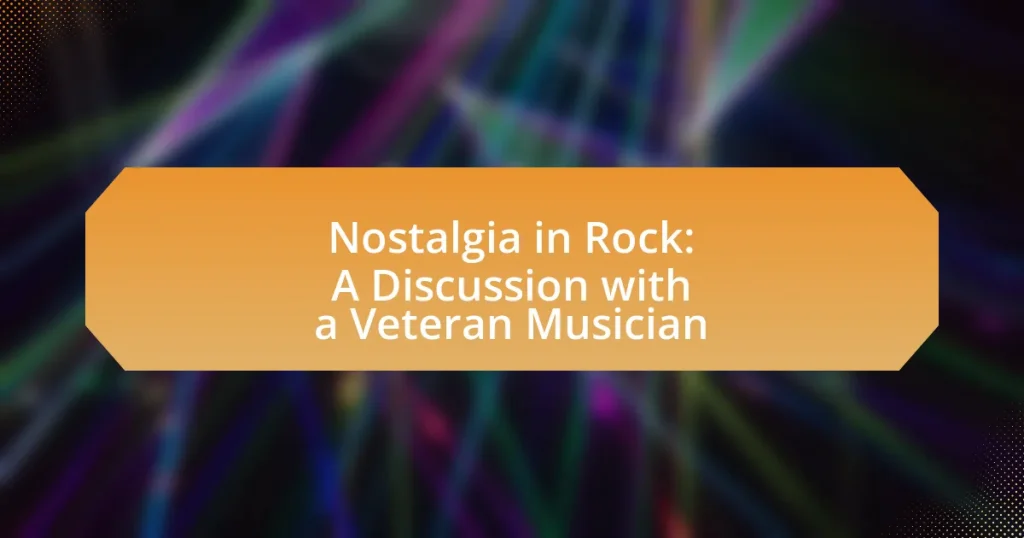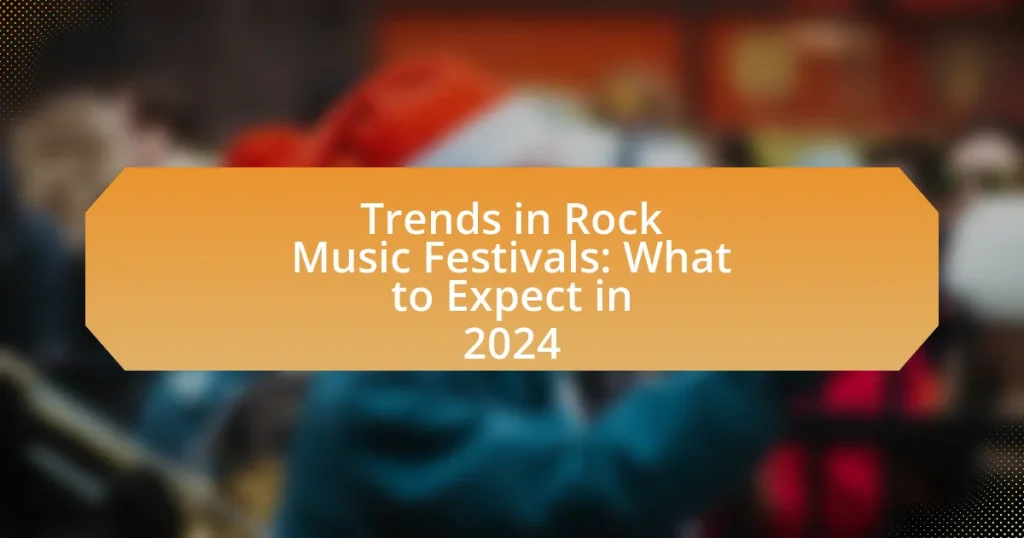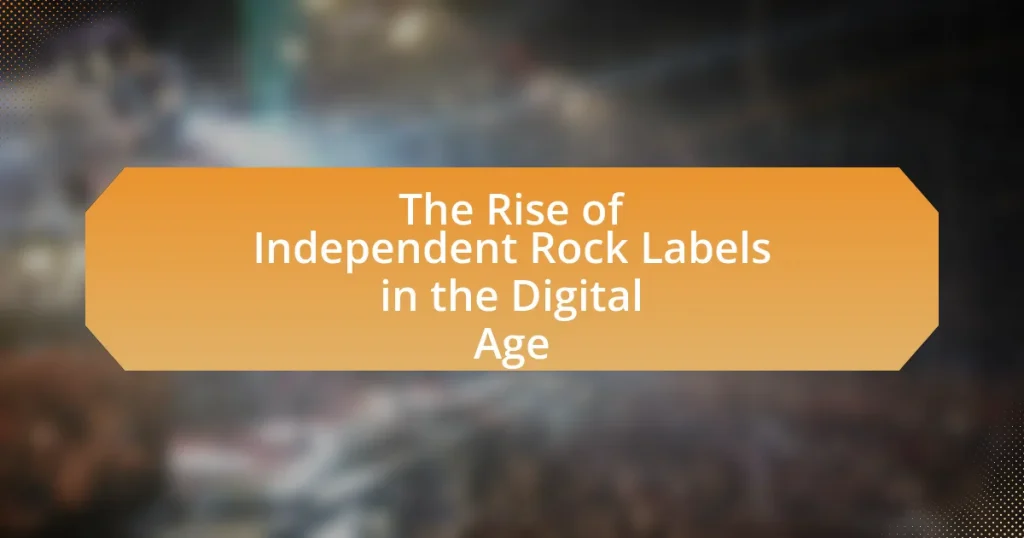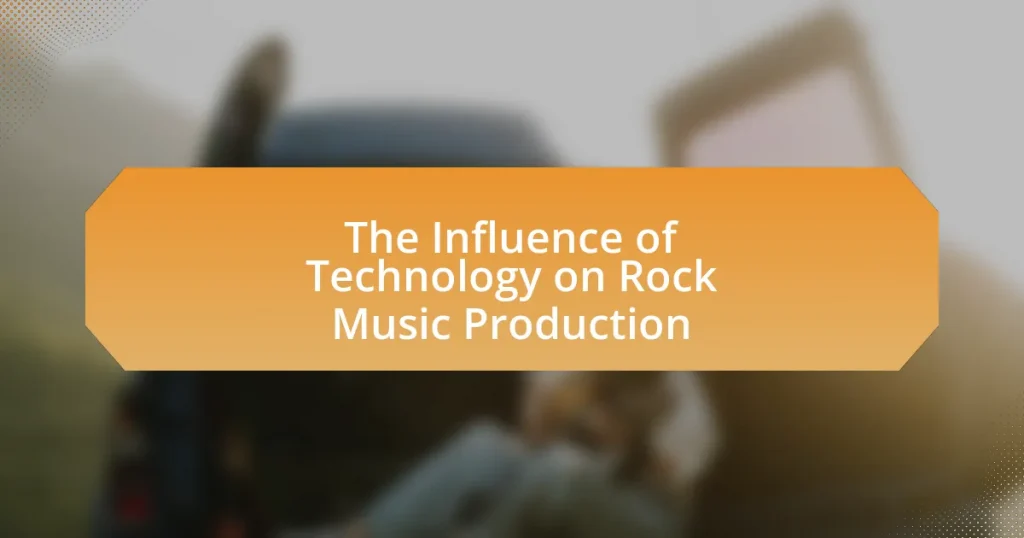Nostalgia in rock music is defined as the emotional longing for the past, often expressed through themes, sounds, and styles reminiscent of earlier musical eras. The article explores how nostalgia influences rock music by shaping themes in lyrics, evoking emotions tied to personal and cultural memories, and enhancing the connection between musicians and their audiences. It discusses common nostalgic themes in rock lyrics, the ways musicians evoke nostalgia through sound and style, and the significance of nostalgia for both artists and fans. Additionally, the article examines the perspectives of veteran musicians on nostalgia, its impact on contemporary rock music, and the potential downsides of relying too heavily on nostalgic elements.
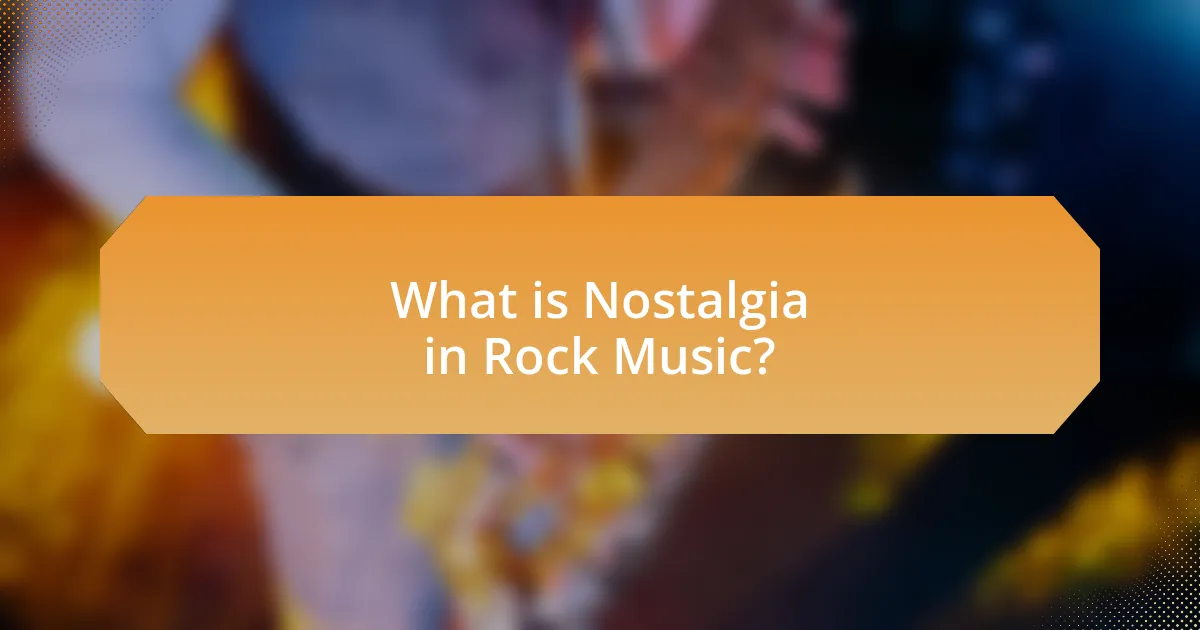
What is Nostalgia in Rock Music?
Nostalgia in rock music refers to the emotional longing for the past, often evoked through themes, sounds, and styles reminiscent of earlier musical eras. This phenomenon is prevalent in rock music as artists frequently draw inspiration from the cultural and musical landscapes of previous decades, creating a sense of familiarity and emotional connection for listeners. For example, the resurgence of classic rock elements in contemporary songs often triggers memories associated with the original era, reinforcing the nostalgic experience. Studies have shown that nostalgia can enhance emotional well-being, making it a powerful tool for artists aiming to resonate with audiences who have a fondness for past musical styles.
How does nostalgia influence the themes in rock music?
Nostalgia significantly influences the themes in rock music by evoking emotions tied to past experiences, memories, and cultural references. This emotional connection often manifests in lyrics that reflect longing for simpler times or iconic moments, as seen in songs like “Summer of ’69” by Bryan Adams, which reminisces about youth and carefree days. Additionally, rock music frequently incorporates historical events and cultural touchstones, such as the Vietnam War or the counterculture movement of the 1960s, creating a sense of shared memory among listeners. Research indicates that nostalgia can enhance emotional responses to music, making it a powerful tool for artists to connect with their audience on a deeper level.
What are some common nostalgic themes found in rock lyrics?
Common nostalgic themes found in rock lyrics include reminiscence of youth, lost love, and cultural milestones. Rock artists often reflect on their formative years, evoking feelings of innocence and freedom associated with adolescence. Songs frequently explore the pain of lost relationships, capturing the emotional weight of nostalgia. Additionally, references to significant historical events or cultural phenomena, such as the counterculture movements of the 1960s and 1970s, serve to connect personal memories with broader societal experiences, reinforcing the theme of nostalgia in the genre.
How do musicians evoke nostalgia through their sound and style?
Musicians evoke nostalgia through their sound and style by incorporating familiar musical elements, such as specific chord progressions, instrumentation, and production techniques that resonate with listeners’ past experiences. For instance, the use of vintage instruments like analog synthesizers or classic guitar tones can transport audiences back to earlier musical eras, creating a sense of familiarity. Additionally, lyrical themes that reflect personal memories or cultural references from previous decades further enhance this nostalgic experience. Research indicates that music can trigger autobiographical memories, making it a powerful tool for evoking nostalgia (Janata, 2009, “The neural correlates of musical nostalgia,” Neuropsychologia). Thus, by blending these elements, musicians effectively tap into listeners’ emotions and memories, fostering a deep sense of nostalgia.
Why is nostalgia significant to rock musicians and their audiences?
Nostalgia is significant to rock musicians and their audiences because it creates a deep emotional connection that enhances the listening experience. This emotional resonance allows musicians to evoke memories and feelings associated with past experiences, often linked to formative moments in their fans’ lives. For instance, songs from the 1960s and 1970s often trigger nostalgia for listeners who associate them with specific events, such as youth, love, or social movements, thereby reinforcing the cultural impact of rock music during that era. Research indicates that nostalgia can increase feelings of social connectedness and well-being, making it a powerful tool for musicians to engage their audience and foster a sense of community.
How does nostalgia shape the identity of rock music genres?
Nostalgia significantly shapes the identity of rock music genres by influencing both the thematic content and the stylistic choices of artists. This emotional connection to the past allows musicians to evoke memories and sentiments associated with earlier eras, often leading to a revival of classic sounds and aesthetics. For instance, the resurgence of 1970s punk and 1980s glam rock elements in contemporary music reflects a longing for the cultural and social dynamics of those times, as seen in bands like The Struts and Greta Van Fleet. Additionally, nostalgia fosters a sense of community among fans, as shared memories of iconic concerts and albums create a collective identity that transcends generations. This phenomenon is supported by studies indicating that nostalgia can enhance emotional well-being and social connectedness, further solidifying its role in shaping the identity of rock music genres.
What role does nostalgia play in the connection between musicians and fans?
Nostalgia plays a significant role in the connection between musicians and fans by evoking shared memories and emotions tied to specific songs or eras. This emotional resonance fosters a sense of belonging and community among fans, as they often associate particular music with formative experiences in their lives. Research indicates that nostalgia can enhance emotional well-being, making fans more likely to engage with musicians whose work reminds them of positive past experiences. For example, studies show that nostalgic music can trigger memories of significant life events, reinforcing the bond between the artist and their audience.
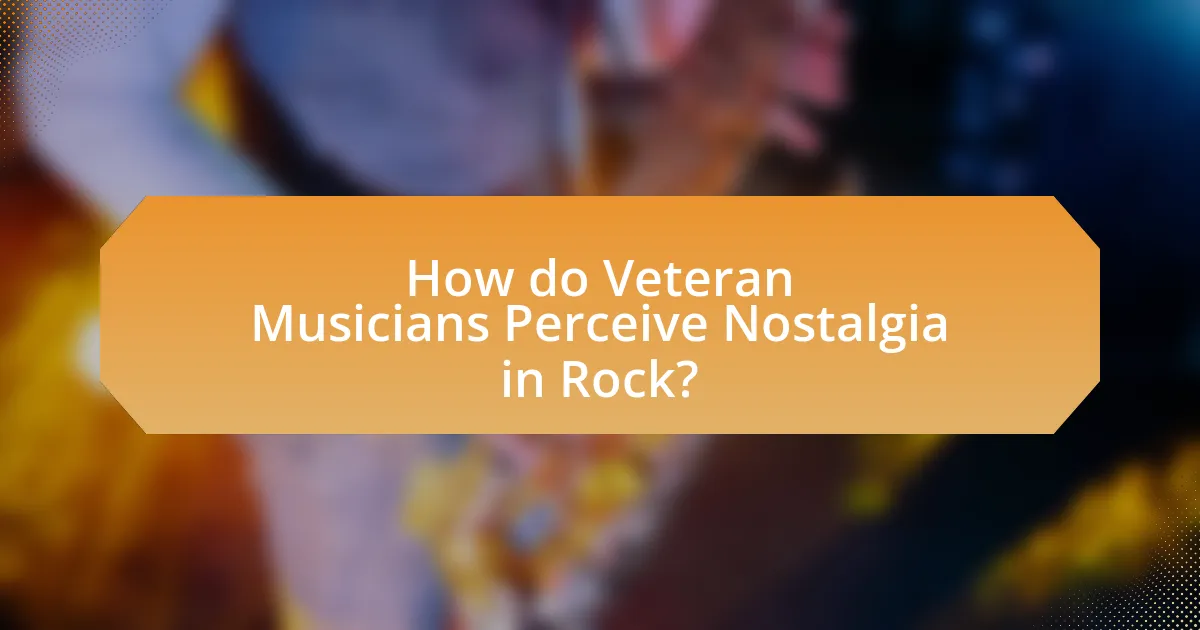
How do Veteran Musicians Perceive Nostalgia in Rock?
Veteran musicians perceive nostalgia in rock as a powerful emotional connection that reflects both personal and cultural memories. This perception is often rooted in their experiences during the genre’s formative years, where iconic songs and performances shaped their identities and the music landscape. For instance, many veteran musicians cite the resurgence of classic rock elements in contemporary music as a testament to the lasting impact of their era, highlighting how younger generations seek to connect with the past through familiar sounds. This connection is further evidenced by the continued popularity of classic rock festivals and tribute bands, which serve as platforms for celebrating the nostalgia associated with the genre.
What insights do veteran musicians offer about nostalgia in their work?
Veteran musicians often express that nostalgia serves as a powerful emotional tool in their work, allowing them to connect deeply with their audience. They highlight that revisiting past experiences and memories through music can evoke strong feelings, creating a sense of familiarity and comfort for listeners. For instance, many musicians draw on personal stories or cultural references from their youth, which resonate with fans who share similar backgrounds. This approach not only enhances the emotional depth of their songs but also fosters a communal experience among listeners, as seen in the popularity of classic rock anthems that reflect the sentiments of earlier decades.
How has the perception of nostalgia changed over the decades?
The perception of nostalgia has evolved significantly over the decades, shifting from a primarily negative connotation associated with longing for the past to a more nuanced understanding that recognizes its emotional complexity and potential benefits. In the early 20th century, nostalgia was often viewed as a psychological disorder, as noted in the writings of medical professionals who linked it to homesickness and melancholia. However, by the late 20th century, particularly during the rise of postmodernism in the 1980s and 1990s, nostalgia began to be embraced as a cultural phenomenon, celebrated in music, film, and art, reflecting a desire to reconnect with simpler times. This shift is evidenced by the popularity of retro trends and revival movements in music, such as the resurgence of classic rock and the incorporation of vintage aesthetics in contemporary media. Today, nostalgia is often seen as a source of comfort and identity, with studies indicating that nostalgic feelings can enhance mood and foster social connections, demonstrating its positive psychological effects.
What personal experiences do veteran musicians share regarding nostalgia?
Veteran musicians often share experiences of nostalgia that revolve around their formative years in music, significant performances, and the emotional connections to their songs. They frequently reflect on the joy and camaraderie of touring with bands, recalling specific concerts that left lasting impressions, such as iconic festivals or intimate venues where they felt a deep connection with the audience. Additionally, many express a sense of longing for the simplicity of earlier times in their careers, when music was a primary focus without the pressures of commercial success. These reflections are often tied to the memories of friendships formed and the cultural impact their music had during pivotal moments in history, reinforcing the emotional weight of nostalgia in their narratives.
In what ways do veteran musicians incorporate nostalgia into their performances?
Veteran musicians incorporate nostalgia into their performances primarily through the selection of classic songs, storytelling, and visual elements that evoke memories. By performing well-known hits from their past, these artists connect with audiences who have personal associations with the music, often leading to emotional responses. Additionally, they share anecdotes and experiences related to the songs, creating a narrative that enhances the nostalgic experience. Visual elements, such as retro stage designs or vintage costumes, further reinforce the nostalgic atmosphere, making the performance a trip down memory lane for fans. This approach not only honors their musical legacy but also fosters a sense of community among audience members who share similar memories tied to the music.
How do live performances evoke nostalgia for audiences?
Live performances evoke nostalgia for audiences by recreating the emotional and sensory experiences associated with past events. The combination of familiar music, shared social interactions, and the atmosphere of a live setting triggers memories linked to significant moments in the audience’s lives. Research indicates that music can activate the brain’s reward system, releasing dopamine and enhancing feelings of nostalgia, particularly when songs are tied to personal memories or cultural milestones. For instance, a study published in the journal “Psychology of Music” by authors such as Janata et al. (2007) found that music can evoke vivid autobiographical memories, reinforcing the connection between live performances and nostalgic feelings.
What specific songs or albums do veteran musicians associate with nostalgia?
Veteran musicians often associate nostalgia with specific songs and albums such as “The Beatles’ Sgt. Pepper’s Lonely Hearts Club Band,” “Bob Dylan’s Highway 61 Revisited,” and “The Rolling Stones’ Let It Bleed.” These works evoke memories of their formative years and significant cultural moments. For instance, “Sgt. Pepper’s” is frequently cited for its groundbreaking approach to music and its impact on the 1960s counterculture, while “Highway 61 Revisited” represents a pivotal shift in rock music and lyrical storytelling. “Let It Bleed” captures the essence of the late 1960s rock scene, resonating with themes of rebellion and change. These albums not only shaped the musicians’ careers but also reflect the broader societal changes of their time, reinforcing their nostalgic value.
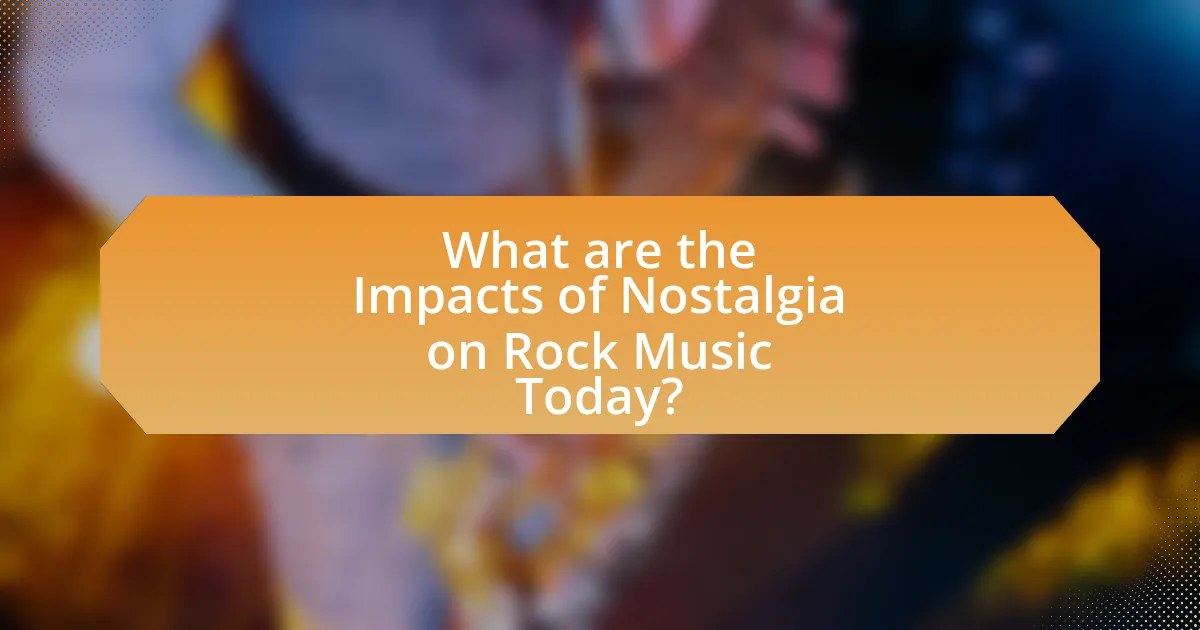
What are the Impacts of Nostalgia on Rock Music Today?
Nostalgia significantly influences rock music today by shaping its themes, aesthetics, and audience engagement. Contemporary rock artists often draw inspiration from classic rock sounds and styles, creating music that resonates with both older fans and new listeners. For instance, bands like Greta Van Fleet emulate the sound of Led Zeppelin, tapping into the nostalgia for the classic rock era while attracting a younger audience. This blending of past influences with modern sensibilities not only revitalizes interest in rock music but also fosters a sense of community among fans who share a collective memory of the genre’s golden age. Additionally, nostalgia-driven marketing strategies, such as reunion tours and anniversary albums, have proven commercially successful, indicating that the emotional connection to rock’s history remains a powerful force in the music industry today.
How does nostalgia affect the creation of new rock music?
Nostalgia significantly influences the creation of new rock music by inspiring artists to draw upon past musical styles, themes, and cultural references. This phenomenon is evident as musicians often incorporate elements from classic rock eras, such as the 1960s and 1970s, to evoke emotional connections with listeners who have fond memories of that time. For instance, the resurgence of guitar-driven melodies and lyrical storytelling in contemporary rock can be traced back to the sounds of iconic bands like The Beatles and Led Zeppelin, which resonate with both older audiences and younger generations discovering these influences. Studies indicate that nostalgia can enhance creativity, as it allows artists to blend traditional sounds with modern sensibilities, resulting in a hybrid genre that appeals to a broad demographic.
What trends in modern rock reflect nostalgic influences?
Modern rock trends reflecting nostalgic influences include the resurgence of classic rock sounds, the incorporation of vintage production techniques, and the revival of iconic fashion styles. Bands like Greta Van Fleet and The Struts emulate the musical styles of the 1970s, drawing inspiration from legendary groups such as Led Zeppelin and Queen. Additionally, the use of analog recording methods and retro synthesizers in contemporary music production evokes the sonic qualities of past decades, appealing to listeners’ nostalgia. This blending of old and new not only resonates with older audiences but also introduces younger generations to the rich history of rock music.
How do contemporary artists pay homage to classic rock through nostalgia?
Contemporary artists pay homage to classic rock through nostalgia by incorporating musical elements, visual aesthetics, and lyrical themes reminiscent of the genre. For instance, many modern musicians utilize vintage instrumentation, such as analog synthesizers and electric guitars, to recreate the soundscapes characteristic of classic rock bands like Led Zeppelin and The Rolling Stones. Additionally, artists often reference iconic album artwork and fashion styles from the 1960s and 1970s in their music videos and promotional materials, evoking a sense of familiarity and connection to that era. This approach not only honors the legacy of classic rock but also resonates with audiences who have a sentimental attachment to that music, as evidenced by the resurgence of vinyl records and tribute concerts celebrating classic rock icons.
What are the potential downsides of nostalgia in rock music?
The potential downsides of nostalgia in rock music include stagnation in creativity and a disconnection from contemporary issues. When artists heavily rely on nostalgic elements, they may produce music that lacks innovation, leading to repetitive sounds and themes that do not resonate with current audiences. For instance, a study by the University of Southern California found that nostalgia can create a preference for past music styles, which may hinder the exploration of new genres and ideas. Additionally, nostalgia can alienate younger listeners who may not relate to the historical context, resulting in a narrower audience and diminished relevance in the evolving music landscape.
How can nostalgia lead to stagnation in musical innovation?
Nostalgia can lead to stagnation in musical innovation by causing artists and audiences to prioritize familiar sounds and styles over new, experimental approaches. When musicians rely heavily on nostalgic elements, such as past genres or iconic riffs, they may limit their creative exploration, resulting in a lack of fresh ideas. For instance, the resurgence of retro genres in the 2010s, like synthwave and grunge revival, often emphasized established formulas rather than pushing boundaries. This reliance on nostalgia can create a cycle where both creators and listeners become resistant to change, ultimately hindering the evolution of music.
What criticisms do some musicians have regarding nostalgia in rock?
Some musicians criticize nostalgia in rock for stifling innovation and creativity. They argue that an overemphasis on past styles and sounds can lead to a lack of originality in contemporary music. For instance, artists like Jack White have expressed concern that the reliance on retro aesthetics can overshadow new artistic expressions, making it difficult for fresh ideas to emerge. This sentiment is echoed by others who believe that nostalgia can create a barrier to the evolution of the genre, as it often prioritizes commercial success over artistic growth.
What practical tips can musicians use to harness nostalgia effectively?
Musicians can harness nostalgia effectively by incorporating familiar sounds, themes, and cultural references from past decades into their music. Utilizing vintage instruments or production techniques can evoke a sense of nostalgia, as seen in the resurgence of analog synthesizers in modern pop music, which connects listeners to the 1980s sound. Additionally, crafting lyrics that reference shared experiences or iconic moments from the past can resonate deeply with audiences, as demonstrated by artists like Taylor Swift, who often draws on personal and collective memories in her songwriting. Engaging with visual aesthetics reminiscent of earlier eras, such as album artwork or music videos, further enhances the nostalgic experience, allowing listeners to connect emotionally with the music.
